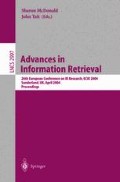Abstract
In this paper we report on a study of implicit feedback models for unobtrusively tracking the information needs of searchers. Such models use relevance information gathered from searcher interaction and can be a potential substitute for explicit relevance feedback. We introduce a variety of implicit feedback models designed to enhance an Information Retrieval (IR) system’s representation of searchers’ information needs. To benchmark their performance we use a simulation-centric evaluation methodology that measures how well each model learns relevance and improves search effectiveness. The results show that a heuristic-based binary voting model and one based on Jeffrey’s rule of conditioning [5] outperform the other models under investigation.
Access this chapter
Tax calculation will be finalised at checkout
Purchases are for personal use only
Preview
Unable to display preview. Download preview PDF.
References
Barry, C.L.: Document Representations and Clues to Document Relevance. Journal of the American Society for Information Science 49(14), 1293–1303 (1998)
Campbell, I., van Rijsbergen, C.J.: The ostensive model of developing information needs. In: Proceedings of the 3rd CoLIS Conference, pp. 251–268 (1996)
Hamming, R.W.: Error-Detecting and Error-Correcting Codes. Bell Systems Technical Journal 29, 147–160 (1950)
Harman, D.: An Experimental Study of the Factors Important in Document Ranking. In: Proceedings of the 9th ACM SIGIR Conference, pp. 186–193 (1986)
Jeffrey, R.C.: The Logic of Decision, 2nd edn. University of Chicago Press, Chicago (1983)
Lam, W., Mukhopadhyay, S., Mostafa, J., Palakal, M.: Detection of Shifts in User Interests for Personalised Information Filtering. In: Proceedings of the 18th ACM SIGIR Conference, pp. 317–325 (1996)
Mitchell, T.M.: Machine Learning. McGraw-Hill, New York (1997)
Robertson, S.E.: On term selection for query expansion. Journal of Documentation 46(4), 359–364 (1990)
Ruthven, I.: Re-examining the Potential Effectiveness of Interactive Query Expansion. In: Proceedings of the 26th ACM SIGIR Conference, pp. 213–220 (2003)
Salton, G. (ed.): The SMART Retrieval System. Prentice-Hall, Englewood Cliffs (1971)
Salton, G., Buckley, C.: Improving retrieval performance by relevance feedback. Journal of the American Society for Information Science 41(4), 288–297 (1990)
van Rijsbergen, C.J.: Probabilistic Retrieval Revisited. The Computer Journal 35(3), 291–298 (1992)
Voorhees, E.H., Harman, D.: Overview of the sixth text retrieval conference (TREC-6). Information Processing and Management 36(1), 3–35 (2000)
White, R.W., Jose, J.M., Ruthven, I.: The use of implicit evidence for relevance feedback in Web retrieval. In: Crestani, F., Girolami, M., van Rijsbergen, C.J.K. (eds.) ECIR 2002. LNCS, vol. 2291, pp. 93–109. Springer, Heidelberg (2002)
White, R.W., Jose, J.M., Ruthven, I.: A task-oriented study on the influencing effects of query-biased summarisation in web searching. Information Processing and Management 39(5), 707–733 (2003)
White, R.W., Jose, J.M., Ruthven, I.: An Approach for Implicitly Detecting Information Needs. In: Proceedings of 12th CIKM Conference, pp. 504–508 (2003)
Author information
Authors and Affiliations
Editor information
Editors and Affiliations
Rights and permissions
Copyright information
© 2004 Springer-Verlag Berlin Heidelberg
About this paper
Cite this paper
White, R.W., Jose, J.M., van Rijsbergen, C.J., Ruthven, I. (2004). A Simulated Study of Implicit Feedback Models. In: McDonald, S., Tait, J. (eds) Advances in Information Retrieval. ECIR 2004. Lecture Notes in Computer Science, vol 2997. Springer, Berlin, Heidelberg. https://doi.org/10.1007/978-3-540-24752-4_23
Download citation
DOI: https://doi.org/10.1007/978-3-540-24752-4_23
Publisher Name: Springer, Berlin, Heidelberg
Print ISBN: 978-3-540-21382-6
Online ISBN: 978-3-540-24752-4
eBook Packages: Springer Book Archive

